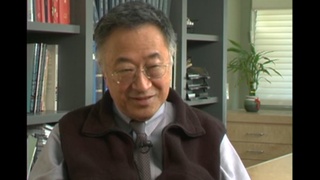Interviews
Reflecting on Japanese Americans' response to incarceration
I think they should have thought of things more. They shouldn't have felt guilty of being a Japanese. They should be proud that they're Japanese and express their feeling, and objected. If they had objected right in the beginning, maybe things like this may not have happened. Maybe something worse might have happened. Who knows? But, the first thing was, let's be obedient and find out what they're going to do to us because they said they're gonna take care of us. And we didn't know to what extent. But as it turned out, it was more like an internee in a concentration camp and when that comes about, you start thinking. And I thought that a lot of the people thought the way I did that this is not right, they're not treating me right so I'm going to rebel. And as I said, it surprised me that a lot of the people didn't think that way. 'Cause I don't feel guilty of what I did. I don't feel guilty that I'm, because I'm a Japanese. I'm an American citizen, born and raised, and you can't take that away from me as a citizenship.
Date: July 25, 1997
Location: Washington, US
Interviewer: Larry Hashima, Stephen Fugita
Contributed by: Denshō: The Japanese American Legacy Project.








